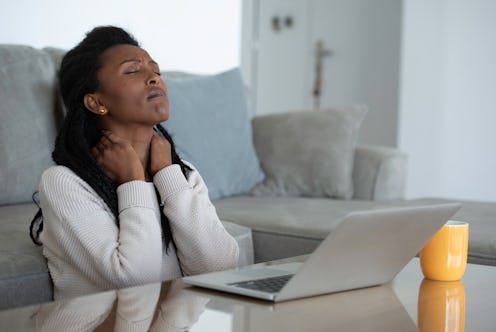Health
Here’s How To Deal With Post-COVID Vaccine Fatigue
Prepare to feel at least a little out of it.

Pretty much everyone has been running on fumes for a year now during the pandemic. Getting vaccinated is a great relief, but it can come with a form of exhaustion all its own. One side effect of the COVID vaccine is feeling super tired, so figuring out how to treat post-COVID vaccine fatigue might be an essential part of your vaccination self-care.
Why Do I Feel Tired After Getting The COVID Vaccine?
It might feel crappy to crash out hard after getting your COVID vaccine, but it's not actually a bad thing in terms of what's happening in your body. "When people experience fatigue after a COVID vaccine, it’s usually an indication that our immune system is working," says Dr. Natasha Bhuyan, M.D., the regional medical director of One Medical. "As our immune system mobilizes cells to fight off the virus in the future, it’s normal for us to feel a sensation of fatigue."
You may also feel more wiped out after the second shot than you did after the first, and that’s normal, too. “Because the body has already started to develop antibodies (it has already been primed) after your first dose, your body responds more robustly after your second dose and you are more likely to be fatigued or have more pronounced side effects in general,” says Dr. Vivek Cherian, M.D., a Baltimore-based internal medicine physician. So even if the first shot didn’t knock you out, it’s not uncommon for the second to hit you like a truck.
When Should I Be Concerned About Post-Vaccine Fatigue?
"While different studies vary, fatigue is the most commonly reported side effect, with around 40-80% of people experiencing this," Dr. Bhuyan explains, across Moderna, Pfizer, and Johnson & Johnson’s vaccines. The way you feel that tiredness, of course, might be much different than how your roommate does. They might have been completely knocked out and had to miss a day of work, whereas you might just need a power nap.
It's normal for people to have varying responses to the vaccine, Dr. Bhuyan tells Bustle. "Some people report being able to work after their vaccine with no issues; others report mild fatigue that is slightly distracting; and yet others report they have taken naps after their vaccine." None of that means that the vaccine is working better or worse — it's just different people's bodies reacting in different ways. Think about that stomach bug you and your bestie both got on spring break that one time — you both caught the same thing, but you were up all night in the bathroom and they mostly just had a bad bellyache.
You might to get concerned if the post-vaccine fatigue wipes you out for more than 48 hours, Dr. Bhuyan says. If it reaches that point, check in with your doctor to make sure everything's OK.
How Do I Treat My Fatigue After Getting My COVID Shots?
Unlike with post-vaccine soreness or headaches, there's not really medicine you can take to help with fatigue, Dr. Bhuyan says. "With any symptoms, it’s best to listen to your body," she explains. "For fatigue, if you need to rest, that is OK. Take it easy and don’t put too much pressure on yourself. Continue to eat healthily and stay hydrated."
You might also want to take some good old-fashioned days off from your usual activities. “Avoiding strenuous activity or drinking alcohol certainly are good practice,” Dr. Cherian says. “Staying hydrated (both before and after vaccination) can also help to minimize not only fatigue, but also other side effects as well.” In addition to downing plenty of H2O, if you're able to call off work or push that deadline back so you can relax, go for it. You'll spring back to normal soon — in the meantime, the best thing you can do for your body is rest.
Experts:
Dr. Natasha Bhuyan, M.D., regional medical director of One Medical
Dr. Vivek Cherian, M.D., Baltimore-based internal medicine physician
This article was originally published on